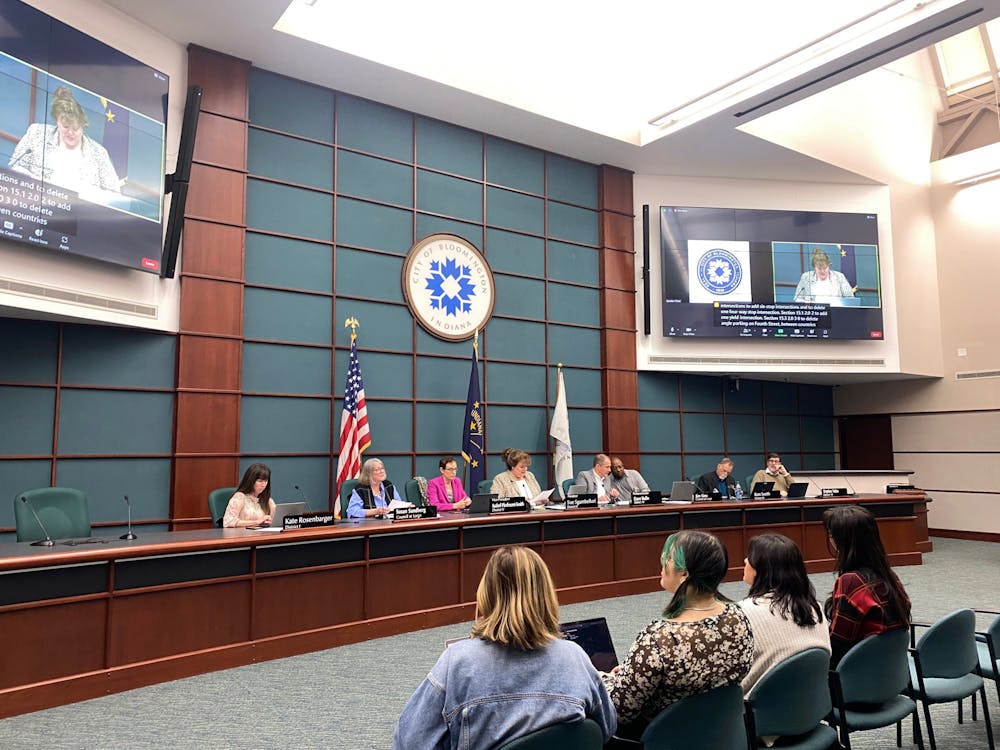The city council heard presentations Tuesday on the progress of the city’s Comprehensive Plan, use of opioid settlement funds and the possibility of making Bloomington a regional hub for tech jobs.
Related: [Primary election voting for mayor, city council begins Tuesday]
Bloomington’s Comprehensive Plan Progress
At Tuesday’s council meeting, Ryan Robling, the city’s planning services manager, gave a presentation on how the city is meeting the goals in its Comprehensive Plan.
Bloomington’s Comprehensive Plan is a 128-page document detailing the city’s vision for the next two decades. Established in 2018, the plan extends to 2040 and includes goals spanning from the economy to environment.
Related: [Election board says felony may have been committed by City Council candidate]
Highlights from the presentation include income growth — per capita income in Bloomington has increased from $43,405 to $51,899 from 2018 to 2021 — and the implementation of a Lake Monroe watershed management plan.
At the same time, the county has seen an increase in deaths and incapacitating injuries from motor vehicles since 2018, which caught Councilmember Isabel Piedmont-Smith's attention.
“We need to do better,” she said.
However, the county has seen a decrease in fatalities and incapacitating injuries overall.
The presentation was part of the city’s annual progress checking, where they choose 25 items from the comprehensive plan to track, Robling said. These 25 items change each year.
Councilmember Matt Flaherty asked if these items could be analyzed in a way that would help the council create better policies to address them, which was echoed by other council members. Robling said he would work on it.
Opioid settlement funds to help address crisis locally
The first ordinance on the agenda was a request to appropriate $391,906 in opioid settlement funds for local organizations working to address the impacts of the opioid crisis.
The settlement agreement comes from a national litigation effort with opioid manufacturers and distributors Johnson & Johnson, AmerisourceBergen, Cardinal Health and McKesson. Every city and town in Indiana is participating in the settlement, according to the Indiana Attorney General’s website.
The city, in partnership with the Community and Family Resources Department, plans to use $70,500 for the department’s Downtown Outreach Program, which aims to help people experiencing homelessness, $100,000 for a matching grant with the Family and Social Services Administration and $221,406 for additional future grants to community organizations.
The matching grant will go toward providing naloxone, a medication that reverses opioid overdose, syringe disposal and educational resources on harm reduction, such as how to use naloxone.
The council approved the appropriation unanimously.
City hopes to turn Bloomington into technology hub
The next ordinance was to appropriate money from the city’s Community Revitalization Enhancement District fund to pay for the construction of the Trades District Technology Center.
The Tech Center would be a sustainably designed building located at the southwest corner of Maker Way and Madison Street. The Center would offer office and meeting spaces and aims to help the Trades District be a hub for technology-focused enterprises in the region.
The Center’s construction will be overseen by the nonprofit corporation Dimension Mill. The nonprofit’s senior vice president, former Bloomington mayor John Fernandez, told the council the Tech Center would help support economic growth throughout the “fourth industrial revolution.”
“This investment tonight is about more than just a building,” Fernandez said.
Median household income in Bloomington lags behind similar cities despite Bloomington’s highly educated workforce, Fernandez said. The tech sector, however, has resisted these trends and boasts good-paying jobs.
Fernandez said the building will be sustainable, with innovations to reduce stormwater runoff and solar panels that will generate at least 25% of the electricity required to run the building.
The ordinance asks for $3,061,391 to fund the project, which has a total estimated cost of $8,519,771. The project is expected to be completed in early 2025 and will have a 10-year economic impact of $218 million, according to a document provided to the council by Dimension Mill.
Valerie Peña, who is involved with University Relations at IU, said the investment would be critical to growing the city’s economy.
“We are hoping that you all will support the spark that's going to take to the flame that will make Bloomington really, truly an ecosystem — for not only great business ideas — but a place that people know, ‘If you want to do something cool, you do it in Bloomington,’” she said.
Although several councilmembers expressed support for the project, Councilmember Stephen Volan expressed concern with the use of CRED funds, instead preferring that Tax Increment Financing District funds be used for the Tech Center. He also wanted more information on how the project could provide jobs to people without college degrees.
Ultimately, the council voted to postpone the matter to its meeting next week.
CORRECTION: This article has been updated to specify the correct progress of the project.



